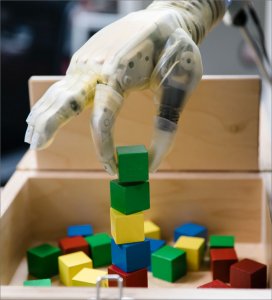Presented By: Michigan Robotics
Implantable Neural Interfaces for Direct Control of Hand Prostheses
PhD Defense, Alex Vaskov

State of the art robotic hands can mimic many functions of the human hand. These devices are a capable of actuating individual finger and multi-joint movements while providing adequate gripping force for daily activities. However, for patients with spinal cord injuries or amputations, there are few options to control these functions seamlessly or intuitively. A common barrier to restoring hand function to both populations is a lack of high-fidelity control signals. Non-invasive electrophysiological techniques record global summations of activity and lack the spatial or temporal resolution to extract or “decode” precise movement commands. The ability to decode finger movements from the motor system would allow patients to directly control hand functions and provide intuitive and scalable prosthetic solutions. This thesis investigates the capabilities of implantable devices to provide finger-specific commands for prosthetic hands. We adapt existing reasoning algorithms to two different sensing technologies.
The first is intracortical electrode arrays implanted into primary motor cortex of two non-human primates. Both subjects controlled a virtual hand with a regression algorithm that decoded their brain activity into finger kinematics. Performance was evaluated with a single degree of freedom target matching task. A state-of-the-art re-calibration approach improved performance, measured as bit rate, by an average of 33.1%. Notably, decoding performance was not dependent on subjects moving their intact hands. In future research, this approach can improve grasp precision for patients with spinal cord injuries.
The second sensing technology is intramuscular electrodes implanted into residual muscles and Regenerative Peripheral Nerve Interfaces of two patients with transradial amputations. Both participants used a high-speed pattern recognition system to switch between 10 individual finger and wrist postures in a virtual environment with an average success rate of 94.7% and a trial latency of 255 ms. When the set was reduced to five grasp postures, average metrics improved to 100% success and 135 ms latency. These results are a significant improvement over state-of-the-art systems that use surface electromyography as inputs. Furthermore, grasp performance remained reliable across arm positions and both participants used this controller to complete a functional assessment with robotic prostheses.
For a more dexterous solution, we combined the high-speed pattern recognition system with a regression algorithm that enabled simultaneous position control of both the index finger and middle-ring-small finger group. Both patients used this system to complete a virtual two degree of freedom target matching task with throughputs of 1.79 and 1.15 bits per second each. The controllers in this study used only four and five differentiated inputs, which can feasibly be processed with portable or implantable hardware.
These results demonstrate that implantable systems can provide patients with fluid and precise control of hand prostheses, eliminating the need to use movement substitutions and triggers to cycle through grip modes. However, clinically translatable implantable electronics need to be developed to realize the potential of these sensing and reasoning approaches. Further advancement of this technology will likely increase the utility and demand of robotic prostheses.
The first is intracortical electrode arrays implanted into primary motor cortex of two non-human primates. Both subjects controlled a virtual hand with a regression algorithm that decoded their brain activity into finger kinematics. Performance was evaluated with a single degree of freedom target matching task. A state-of-the-art re-calibration approach improved performance, measured as bit rate, by an average of 33.1%. Notably, decoding performance was not dependent on subjects moving their intact hands. In future research, this approach can improve grasp precision for patients with spinal cord injuries.
The second sensing technology is intramuscular electrodes implanted into residual muscles and Regenerative Peripheral Nerve Interfaces of two patients with transradial amputations. Both participants used a high-speed pattern recognition system to switch between 10 individual finger and wrist postures in a virtual environment with an average success rate of 94.7% and a trial latency of 255 ms. When the set was reduced to five grasp postures, average metrics improved to 100% success and 135 ms latency. These results are a significant improvement over state-of-the-art systems that use surface electromyography as inputs. Furthermore, grasp performance remained reliable across arm positions and both participants used this controller to complete a functional assessment with robotic prostheses.
For a more dexterous solution, we combined the high-speed pattern recognition system with a regression algorithm that enabled simultaneous position control of both the index finger and middle-ring-small finger group. Both patients used this system to complete a virtual two degree of freedom target matching task with throughputs of 1.79 and 1.15 bits per second each. The controllers in this study used only four and five differentiated inputs, which can feasibly be processed with portable or implantable hardware.
These results demonstrate that implantable systems can provide patients with fluid and precise control of hand prostheses, eliminating the need to use movement substitutions and triggers to cycle through grip modes. However, clinically translatable implantable electronics need to be developed to realize the potential of these sensing and reasoning approaches. Further advancement of this technology will likely increase the utility and demand of robotic prostheses.